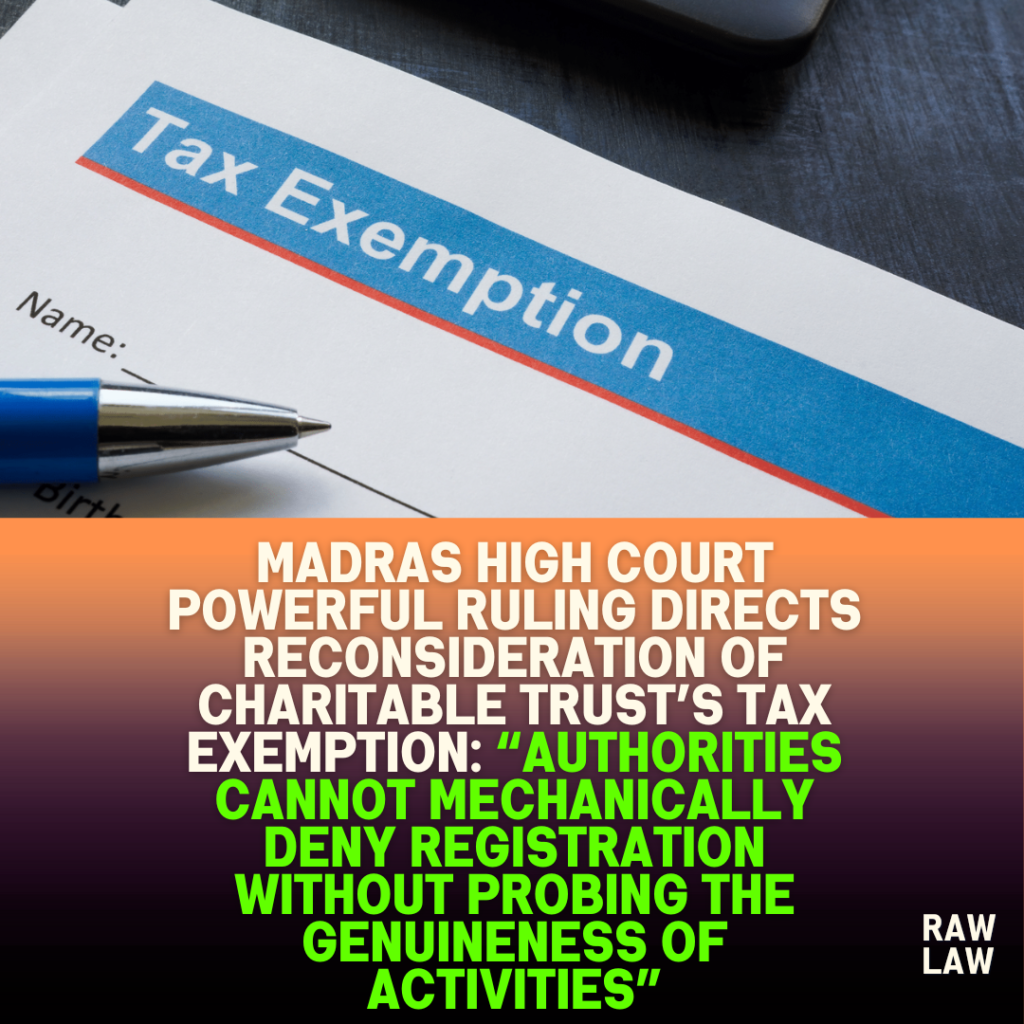Court’s decision
The Madras High Court set aside the order rejecting the trust’s request for renewal of tax exemption and directed the authority to reconsider the application strictly in accordance with statutory provisions. The Court held that the rejection was unsupported by reasons, suffered from non-application of mind, and failed to examine the trust’s activities, accounts, or compliance. Emphasising that “charitable intent cannot be brushed aside on conjectures,” the Court ordered a fresh evaluation within a fixed timeframe. The Court reiterated that the scope of enquiry under exemption provisions is limited to genuineness and compliance, not suspicion or irrelevant considerations.
Facts
The petitioner trust, established with the stated objective of running educational institutions and providing learning facilities, applied for renewal of tax exemption under statutory provisions governing charitable entities. The application was rejected by the authority on the ground that certain details were not satisfactory and that the trust had allegedly failed to substantiate its charitable activities. The trust contended that it had supplied all required records, including audited statements, activity reports, and governing documents, but the authority passed a non-speaking order failing to refer to or assess these materials. After receiving an adverse appellate order, the trust approached the Madras High Court seeking judicial review.
Issues
The Court identified the following issues for determination:
- Whether the rejection order met statutory requirements for assessing genuineness and compliance of a charitable trust.
- Whether the authority properly considered the documents and explanations furnished.
- Whether non-speaking orders in exemption matters violate principles of natural justice.
- Whether lack of specific findings on activities and accounts justifies judicial intervention.
- Whether the appellate authority applied the correct legal standards.
Petitioner’s arguments
The trust asserted that the authority mechanically rejected the exemption request without examining the substantial documents provided, including audited accounts, bank statements, details of teaching programmes, and evidence of educational activities. The trust argued that the order lacked detailed reasoning and cited no discrepancies. It emphasised that exemption denial affects its ability to run educational programmes for underprivileged students. The trust submitted that the authority exceeded its jurisdiction by raising irrelevant concerns that did not relate to genuineness, and completely ignored statutory safeguards requiring reasoned orders. The trust therefore urged the Court to quash the defective orders and direct fresh consideration.
Respondent’s arguments
The authority argued that the trust had failed to demonstrate compliance with mandatory qualifying conditions for charitable exemption. It claimed that certain documents were incomplete and that the nature of the trust’s operations was unclear. The authority submitted that it had discretionary power to examine the materials and deny relief where doubts exist regarding the genuineness of activities. It also contended that the trust had alternative remedies and that judicial interference was unwarranted in administrative decisions linked to revenue assessment and public interest.
Analysis of the law
The Court examined statutory provisions governing registration and exemption of charitable institutions, observing that authorities must confine their enquiry to verifying genuineness of activities and adherence to statutory parameters. The Court reiterated that scope of scrutiny does not extend to evaluation of income utilisation in assessment-like fashion. It underscored that denial of exemption must be based on concrete reasons and supported by examination of accounts, activities, and governing documents. The Court clarified that authorities must record satisfaction objectively and supply clear findings on compliance, transparency, and genuineness—mere doubts cannot support adverse orders.
Precedent analysis
The Court referred to established precedents holding that registration/exemption under charitable laws cannot be denied without cogent reasons. Earlier decisions emphasised that administrative orders must be speaking orders reflecting application of mind and assessment of evidence. Courts have consistently held that genuineness cannot be inferred negatively from absence of subjective satisfaction, but must be determined on documents and activities presented. These precedents guided the High Court in concluding that the authorities failed to follow mandatory evaluative standards.
Court’s reasoning
The Madras High Court found that the rejection order was devoid of reasoning and failed to refer to any specific defect in the trust’s documents. The authority did not examine the trust’s accounts, activities, or evidence of educational work. Instead, it relied on broad assertions unsupported by factual analysis. The Court held that such orders violate natural justice and demonstrate non-application of mind. The appellate order was also found to be perfunctory, as it merely echoed the original rejection without independent scrutiny. The Court observed that decision-making affecting charitable institutions must be transparent, reasoned, and evidence-based.
Conclusion
The Madras High Court quashed the rejection order and directed the authority to reconsider the matter afresh after examining all relevant documents. It instructed that a speaking order must be issued, furnishing reasons and applying correct statutory standards. The Court clarified that authorities cannot deny exemption mechanically and that the trust is entitled to a fair, lawful evaluation of its application. The writ petition was allowed with directions to complete the fresh consideration within a stipulated timeframe.
Implications
This ruling reinforces strict compliance standards for administrative authorities dealing with charitable registrations and exemptions. It ensures that trusts are protected from arbitrary or poorly reasoned decisions. The decision strengthens judicial oversight in tax exemption matters, compelling authorities to examine documents thoroughly, apply statutory criteria, and issue detailed orders. The judgment also empowers educational and charitable institutions to seek redress where administrative orders are vague, unsupported, or procedurally unfair.



